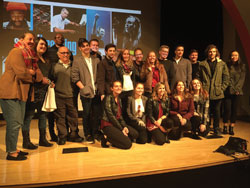Walking down the street, languages from every person’s homeland are heard: Spanish, Russian, Polish, French, and so many other native languages fill the air with cultural awareness. Our people are vibrant and make for a flourishing land filled with cultures all over the world.
According to The Daily Texan, “The United States is largely monolingual. In fact, only about 15-20 percent of Americans consider themselves bilingual.” This low percentage further increases the likelihood that citizens, natural born or otherwise, will end up either being shamed or feeling ashamed for speaking in their native tongue or being prideful in their cultures and nationalities.
Dr. Mirta Barrea-Marlys, Chair of the Department of World Languages and Cultures, said, “I have seen this reaction and have experienced it myself when I first came to this country from Argentina. It was hard to assimilate into a different culture, especially since I did not speak English and back then there weren’t any ESL [English as a Second Language] programs to help students in schools.”
Additionally, the fluctuation in numbers for the college track for Spanish has seen a variation in numbers, “There is always fluctuation of interest in different language fields. For example, there used to be many more Education/World Language majors, but the numbers have dropped as it has in other areas of Education,” Barrea-Marlys added.
Getting accustomed to a new environment is scary in and of itself, but, coming into a new country and having to immerse yourself in a new culture is something that cannot be imagined. Many foreign students and citizens that emigrated to another country, like the United States, experience a degree of culture shock–a sense of confusion or uncertainty that can end up having an affect on people exposed to another culture or environment without adequate preparation.
Dr. Julia Riordan-Goncalves, Director of Spanish and International Business Major and Spanish for Business Minor, said, “It is sad first, because their culture and multilingualism is a part of who they are; it is a part of their identity and history.”
“Second, it is an indication that we still have a lot to do to overcome stereotypes and discrimination in the U.S. At the same time, I have met many students who are proud of being multilingual, and others who have overcome their embarrassment and gain confidence in their speaking abilities,” Riordan-Goncalves continued.
Valentina Sanchez, a junior Communication and Spanish student, is the President of the Spanish club. Sanchez, who is also multilingual, said, “When I first moved to the United States, I was so scared people were not going to like me because ‘I wasn’t like them.’ I didn’t sound like them, but I looked like I could be American and that made people feel weird.”
“I was never ashamed of my culture but I didn’t like the fact that I was different and that had a lot to do with how some people treated me when I first moved here,” Sanchez continued.
Riordan-Goncalves also talked about an important topic: students who are multilingual are, at times, very intimidated by sharing their knowledge and fluency in that language. This also goes for students who have learned the language over time instead of learning it as their first language.
Junior political science and Spanish student, Keith Lee, said, “It [studying another language] makes understanding people easier as studying the culture and language of another group of people opens up the ability to put yourself in another person’s shoes. We live in a very diverse society where, in my opinion, it is essential to learn about, appreciate, and indulge in other cultures.”
The multilingual population throughout not only college, but throughout life, has seen some fluctuation. As a general education requirement, students are to take at least six credits from a foreign language, or take a Global Understanding course in lieu of those courses.
Sanchez commented, “being multilingual is one of the greatest skills a person can have in today’s world. The world is changing, diversity has become the norm.”
“Being able to connect with different people from different cultures who speak different languages allows you to grow, to see the world from a different perspective, to be aware of the differences between cultures and teaches you to respect and love everyone for how unique they are,” Sanchez added.
The importance of continuing a language is not limited to just the business, career, and education fields, but also for your mental stability and health. Riordan-Goncalves commented, “Knowing another language actually changes a person’s brain – it creates new pathways that wouldn’t be there otherwise. It gives a person another perspective through which he or she sees the world, and it opens up so many possibilities – linguistically, culturally, professionally and personally.”
Though studying a language may seem like a daunting task, it is important to recognize that the benefits far outway any cons or setbacks someone may think they cause. Italian director, Federico Fellini, stated, “a different language is a different vision of life.”
In the career field it is important to note that, “a job seeker does not need to be completely bilingual or multilingual to have value as a language speaker. In some professions, such as interpreting and high-level government jobs, this is true, but in general an intermediate or higher level of proficiency is very beneficial, and it can improve greatly over time,” Riordan-Goncalves said.
Multilingualism provides people with numerous perspectives to look at the world from; learning a language, in turn, means you learn a culture. Studying a language means being immersed in art, reading, history, and so many other aspects of day to day life. Barrea-Marlys said, “I would tell students that there is nothing that transforms you more than language study and if there is one thing you can do to prepare for life after Monmouth, take language classes and study abroad! After all, “One who knows two languages is worth as much as two.”- Spanish proverb.”



